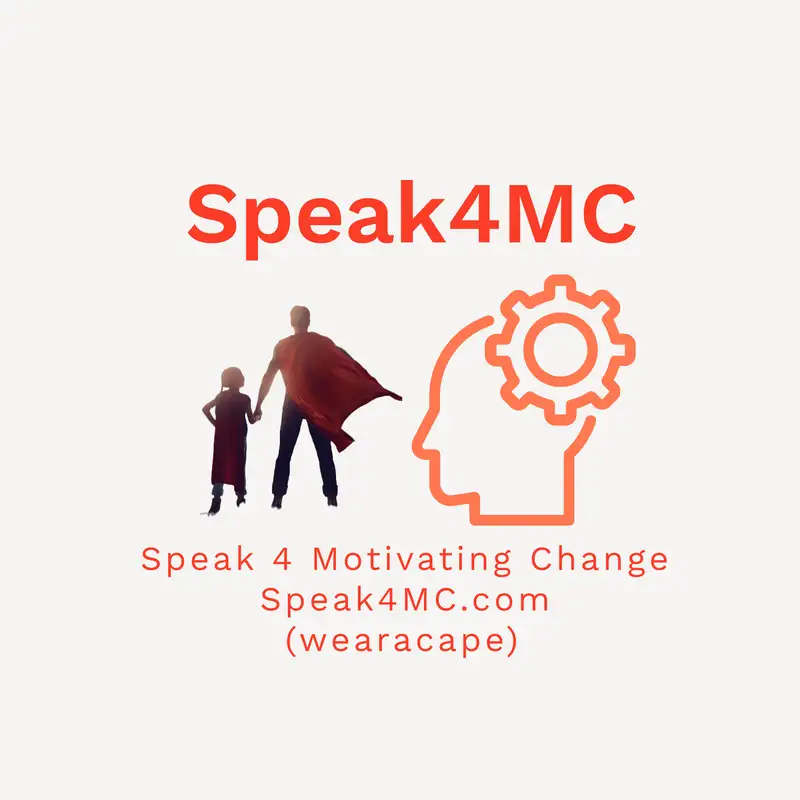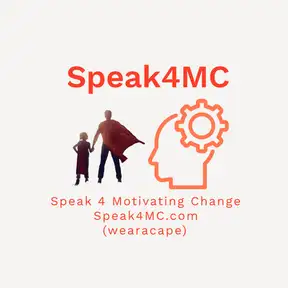Why It's Empathy Here & Not There
hello everyone
welcome to empathy here not there
my new podcast I'm your host
Curtis Camponi
and I am thrilled to embark on this journey with you
let me start with a quick story
that really highlights why
I am here today why am I making this podcast
empathy here not there
after I gave a keynote speech on empathy
at a national conference
I found myself in an argument with a friend
on the phone in an elevator
after I got off the elevator
I noticed someone looking at me with a judgmental glare
I don't know about you but if you're getting that look
you kind of wanna figure out what's going on with it
so I walked over to him
I asked them how they were doing
try to make small talk and they shared that
they were in my keynote speech earlier
where I talked about empathy
but then they were also in that elevator
when I was arguing with my friend
they didn't reference my conversation directly
but they did say hmm
that wasn't very empathetic of you
was it that was a pivotal moment for me
because it made me realize
how easy it is to speak about empathy
but it's so much harder to practice it consistently
in our daily lives
it's one thing to have empathy in a public setting
but another
to have it in our personal moments of frustration
and conflict this is why we are here today
this is why I created this podcast
let's explore empathy
and how it's applied in different contexts
in other words
do I have empathy here but not over there
look empathy is a powerful tool that can transform
our relationships our workplaces
our communities and even our political landscape
and each of the episodes of this podcast will explore
empathy in a specific context
from politics to social media
from leadership to family dynamics and much
much more before we dive into the various episodes
let me share a bit about myself
and why I'm so passionate about this topic
my name is Curtis Camponi
I never I never I never
go put it on video and then my little
can impact our lives in profound ways
I am the founder of speak for MC
which stands for speak for Motivating Change
and the author of the book Cape Conversations
How Superheroes Communicate with children
which can be found on Amazon right now
check it out Cape Conversations
my goal with this podcast
is not only to highlight the importance of empathy
but also provide practical insights
and real world examples that can help us all
become more empathetic individuals
so what are we gonna be talking about
well
let me give you a sneak peek into some of the exciting
episodes we have lined up
1 empathy in politics bridging the divide
whoa are we actually gonna explore this topic now
with the current climate
I think it's more important than ever
we're gonna explore
how empathy can help bridge ideological device
foster more constructive political discourse
more conversations that actually lead to change
then we're gonna talk about empathy at the dinner table
family dynamics
discover how empathy can improve family relationships
and communication do you find that
sometimes it's easier to empathize with a co
worker than it is your spouse
there's a real reason for that
then we're gonna talk about empathy with friends
how we can strengthen those bonds
learn practical ways to be a more empathetic friend
and deepen your connections
what about for my leaders
we're gonna talk about empathy and leadership
leading with the heart highlighting the impact of
epithetic leadership on workplace
culture and productivity
but usually don't start as a leader
you gotta work yourself up
so we're gonna also talk about empathy with co workers
how to build a supportive workplace and culture
strategies for promoting empathy among colleagues
to enhance teamwork and collaboration
and yes we are gonna talk about empathy on social media
how to navigate online interactions
address the challenges and
opportunities of practicing empathy in the digital age
empathy on Facebook what
empathy on YouTube what we're gonna talk about it
we're also gonna talk about empathy
in various professions such as empathy and healthcare
patient provider perspectives
the transformative power of empathy and patient care
and healthcare provider well being
the bottom line is
each episode will feature personal stories
expert insights
practical tips and listener interactions
you create a rich and engaging experience
I'm excited to embark on this empathy journey with you
and I hope
you find these conversations as enlightening
and inspiring as I do look
the bottom line is if you want to inspire change
if you want to reach solutions
instead of just identifying all these problems
it starts with empathy you can find the empathy here
not there on all popular podcast platforms
plus you can watch the video podcast
every Wednesday on the speak for MC
YouTube channel we're gonna start out with recordings
but then eventually
offer you some live content as well
thank you for joining me on the empathy here
not there make sure to subscribe
and stay tuned for our first episode
where we'll dive into empathy in politics what
on that note we can't roll in Episode 1
without first laying the foundation of what empathy is
here it is
empathy is the cornerstone of human connection
and understanding so
let's take a look at different types of empathy
and how they impact our relationships
so we don't get empathy overload
the very first things we have to understand
that empathy is
a powerful tool that allows us to connect with others
on a deeper level it's about understanding
and sharing the feelings of another person
but empathy isn't a one size fits all
it can be cognitive
where we understand someone else's perspective
or emotional or we actually feel what they're feeling
as someone who is facilitated
does anyone here have a LinkedIn profile
I know LinkedIn isn't a
it can bridge gaps
heal wounds and foster genuine connections
think about a time
when you had a disagreement with a friend
or a family member maybe it was about politics
a personal decision
or something as simple as where we want to eat
when someone truly understood your perspective
how did that change the dynamic
that connection that feeling of being heard
being seen
is what everything can bring to our personal
and professional relationships
it's critical we understand that
there's a real difference between empathy and sympathy
seeing someone's perspective
or just feeling bad for them
empathy is not just a skill
it is a habit that we have to develop
it is something we have to practice that consistently
every day and something that gets harder
depending on the topic that we're being asked to
empathize with sympathy can drive disconnection
empathy can drive collaboration
empathy is feeling with people
so how can you practice empathy
1 you gotta practice active listening
you gotta focus fully on the speaker
make eye contact
reflecting back what you hear without judgment
if you actually want to understand
someone's perspective
you gotta care what their perspective is
use empathetic statements like
I can see that you're really upset
or that sounds really tough
be present avoid distractions
we know there's so many things that are vying for your
attention but if your goal is to be epithetic
you gotta push all that aside
and lock in to what that person is saying
give them your full attention
who is that person you're interacting with
and why do they think the way they think
in each episode we're gonna
kind of
shift back and forth between cognitive and emotional
empathy cognitive empathy is more about
understanding someone's perspective
it's like stepping into their shoes
whether without the emotional burden
in other words the way we see the world has been shaped
since we were a little little kid
our neighborhood our faith
our family our experiences
our successes our failures
have all shaped the lens that we look through
emotional empathy on the other hand
is about feeling what they feel
both types have their place
but they also have their challenges
I've had
the privilege of working with various professionals
from healthcare workers to educators
haha
human interactions their experiences highlight
the nuances between cognitive
and emotional empathy studies indicate that cognitive
empathy helps in problem solving
and conflict resolution
by providing clear understanding of others viewpoints
emotional empathy however
strengthens the bonds
the trust that we have with someone
it builds those emotional relationships
cognitive empathy can enhance leadership effectiveness
by promoting better decision making
and fostering innovation fostering creativity
idea sharing imagine a scenario at work
where a colleague misses a deadline
instead of getting frustrated
you try to understand their situation
maybe they have personal issues
or overwhelmed with task by using cognitive empathy
you can address the root cause of the problem
without getting emotionally overwhelmed
it's critical to understand with cognitive empathy
it's not about right or wrong
it's not about justifying their behavior
or making excuses for it
it's just about trying to understand what LED to it
think about a time when someone really
understood your situation
from both a logical and emotional perspective
it's likely it made you feel supported and validated
in the description
I'm gonna share some other YouTube videos that do an
excellent job explaining empathy
I really encourage you to watch those
before episode 1 comes first
it's gonna be hard for you to
separate yourself emotionally
from some of the things we're gonna discuss
if you don't first
understand what the overall goal of empathy is
empathy also is critical to emotional intelligence
trying to understand someone's thoughts
their feelings
trying to get a read from where they're coming from
emotional empathy allows us to respond appropriately
to the here and the now
so how do you develop cognitive empathy
well one
you gotta practice perspective taking
you gotta imagine yourself in someone else's shoes
ask how they might be feeling and why
and then asking questions
and reflecting on the things they're saying
to see if
you're gaining some understanding of
what the world looks like
you can engage an emotional empathy
by engaging in activities that
allow you to connect with others
on an emotional level volunteering
participating in community events
exposing yourself to situations that
you normally wouldn't be in
to understand how people are feeling
from where they're from
it's key that we balance both types of empathy
use cognitive empathy maybe in professional settings
and make objective decisions
and emotional empathy in person relationships
to build those deeper connections
we need both
and both are critical to inspire and change
in the end I'm not going to lie to you and say
practicing empathy is easy
maybe in conversations
where the topic doesn't emotionally trigger you
you can ask questions you can reflect
you can learn you can understand
but it seems like almost every topic now
is laced with this emotional component
that really makes it difficult for us to empathize
this podcast is gonna challenge you to get beyond that
not because I have a podcast about it
or not because it's something fun to do
but because it can truly change the world
it can bring people together
it can unite different perspectives
it can inspire collaboration on a higher level
what we need it's what we need
so I look forward to you joining me on this journey
I look forward to your comments
your thoughts and together
we will determine is empathy here and not there
see y'all soon
I want to miss you

